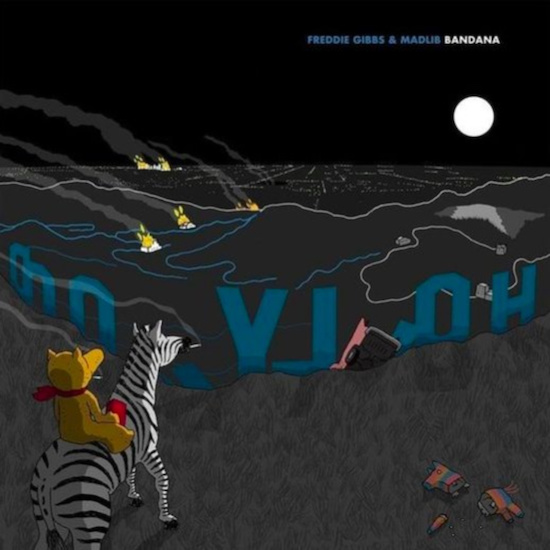There’s a certain alchemy in hip-hop whereby the pairing of MC and producer becomes more than the sum of its parts. It’s there in the pairing of Cannibal Ox and El-P on The Cold Vein, or with Pusha and Kanye on DAYTONA; the sense of a reciprocal apprehension, each finding a resonance in the other allowing them to step a foot taller, shine a stop brighter.
Whatever that secret ingredient is, Freddie Gibbs and Madlib have it in spades. On Bandana, Gibb’s gritty incisiveness provides a bracing counterpoint to the bleary-eyed bliss of Madlib’s visionary production. Madlib has found this kind of chemistry before, most notably on Madvillainy with MF Doom, but – perhaps a facet of his restless, journeyman wanderlust – has rarely returned to it. This collaboration with Gibbs, however, is going to be more than a flash in the pan it seems, with Bandana, the pair’s second album as a duo, reportedly the second instalment in a trilogy (Piñata, Bandana, and somewhere in the future, we’re told, Montana).
Madlib is the producer as auteur, one of hip-hop’s most singular, distinctive artists. His name is justifiably on the billing here, and if I’m honest I’m turning up more for him than for Gibbs, as for Charlie Kaufman on Eternal Sunshine of the Spotless Mind. As Eden Tizard’s recent crate-rummage for The Quietus back through the Beat Konducta archive illustrates, Madlib’s career as a producer is worth tracing in its own right, looking beyond the spotlights to follow the shadowy figure behind the desk. (I’ve frequently bought albums by artists I’d never heard of before – Dudley Perkins, Percee P – off the strength of a Madlib producer credit, something I’ve only otherwise done for Dilla or El-P).
And yet, there’s something about the partnership with Gibbs that raises first Piñata and now Bandana to the level of essential listening. Not all Madlib’s collaborations have found this same level of spark and crackle. For every Madvillainy, Seeds or In Search of Stoney Jackson, there’s an Illmindmuzik where Madlib’s outward-reaching obfuscations, partnered with less incisive performers, have risked records drifting into a thick fug of inscrutability.
On Bandana, however, Gibbs brings an excoriating sense of focus and propulsion, powering the record through with considerable urgency. Bandana is notably fiercer than it’s predecessor, perhaps reflecting the fact Gibbs wrote many of the lyrics whilst in jail for charges for which he was subsequently fully acquitted). Tracks like and ‘Massage Seats’ and ‘Situations’ bare significantly sharper teeth than the more familiar, blunted Madlib vibes of Piñata and ‘Half Manne Half Cocaine’, in particular, has a mid-track step-up reminiscent of the brutal outgoing minutes of Run the Jewels’ ‘Oh My Darling (Don’t Cry)’ or Kendrick’s ‘DNA’; the white heat of drills into concrete.
Whilst Bandana doesn’t have Piñata’s same effortless sense of an instant classic, it has considerably more urgency and contemporary punch, also reflected in the once-again immaculate choice of collaborators, Killer Mike and Pusha T in particular contributing a devastating sucker-punch to ‘Palmolive’. There’s notably more trap and street rap stylings, suggesting the axis has shifted a little more towards the orbit Gibbs has recently inhabited on You Only Live 2wice and Freddie. Gibbs has spoken of being conscious of standing his ground within the duo’s dynamic: “For me to get with Madlib, I can’t go weird. I’ve got to keep it gangsta… I brought the streets to the Madlib fans”. And yet, if Gibbs has brought greater urgency and focus, this is unmistakably still a Madlib joint, and alongside the more familiar crate-digger aesthetic of ‘Practice’ or ‘Cataracts’, it’s a joy to hear late-decade trap given a Madlib makeover, the producer finding all sorts of pockets of strangeness, unfamiliar spice and detail between more recognisable hi-hats and snares.
Not dissimilar to the back and forth of Champion Sound, Madlib’s seminal collaboration with J Dilla, Bandana throughout has the sense of a dialectic; a push and push-back that at moments has the energy of argument. For all Madlib’s cosmic, singular touch as a producer it seems one of his greatest strengths remains his ability to engage in conversation.



